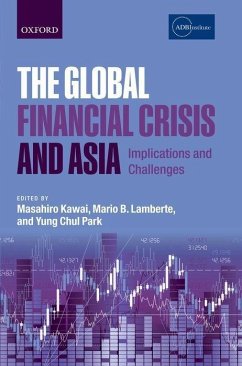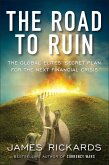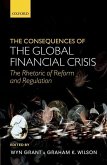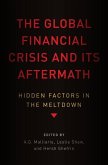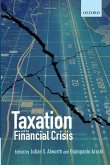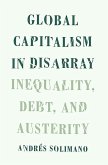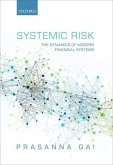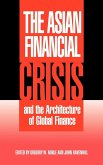The Global Financial Crisis and Asia
Implications and Challenges
Herausgeber: Kawai, Masahiro; Park, Yung Chul; Lamberte, Mario B
The Global Financial Crisis and Asia
Implications and Challenges
Herausgeber: Kawai, Masahiro; Park, Yung Chul; Lamberte, Mario B
- Gebundenes Buch
- Merkliste
- Auf die Merkliste
- Bewerten Bewerten
- Teilen
- Produkt teilen
- Produkterinnerung
- Produkterinnerung
This book demonstrates how Asian countries tried to minimize the impact of the global financial crisis, identifies structural weaknesses in their economies, and discusses policy options for strengthening Asian economies to avoid future crises and promote sustainable growth in the long-term.
Andere Kunden interessierten sich auch für
![The Road to Ruin: The Global Elites' Secret Plan for the Next Financial Crisis The Road to Ruin: The Global Elites' Secret Plan for the Next Financial Crisis]() James RickardsThe Road to Ruin: The Global Elites' Secret Plan for the Next Financial Crisis24,99 €
James RickardsThe Road to Ruin: The Global Elites' Secret Plan for the Next Financial Crisis24,99 €![The Consequences of the Global Financial Crisis The Consequences of the Global Financial Crisis]() The Consequences of the Global Financial Crisis173,99 €
The Consequences of the Global Financial Crisis173,99 €![The Global Financial Crisis and Its Aftermath The Global Financial Crisis and Its Aftermath]() The Global Financial Crisis and Its Aftermath151,99 €
The Global Financial Crisis and Its Aftermath151,99 €![Taxation and the Financial Crisis Taxation and the Financial Crisis]() Taxation and the Financial Crisis167,99 €
Taxation and the Financial Crisis167,99 €![Global Capitalism in Disarray Global Capitalism in Disarray]() Andres SolimanoGlobal Capitalism in Disarray70,99 €
Andres SolimanoGlobal Capitalism in Disarray70,99 €![Systemic Risk: The Dynamics of Modern Financial Systems Systemic Risk: The Dynamics of Modern Financial Systems]() Prasanna GaiSystemic Risk: The Dynamics of Modern Financial Systems162,99 €
Prasanna GaiSystemic Risk: The Dynamics of Modern Financial Systems162,99 €![The Asian Financial Crisis and the Architecture of Global Finance The Asian Financial Crisis and the Architecture of Global Finance]() W. Noble / John Ravenhill (eds.)The Asian Financial Crisis and the Architecture of Global Finance101,99 €
W. Noble / John Ravenhill (eds.)The Asian Financial Crisis and the Architecture of Global Finance101,99 €-
-
-
This book demonstrates how Asian countries tried to minimize the impact of the global financial crisis, identifies structural weaknesses in their economies, and discusses policy options for strengthening Asian economies to avoid future crises and promote sustainable growth in the long-term.
Produktdetails
- Produktdetails
- Verlag: Oxford University Press, USA
- Seitenzahl: 344
- Erscheinungstermin: 29. Dezember 2012
- Englisch
- Abmessung: 234mm x 155mm x 28mm
- Gewicht: 658g
- ISBN-13: 9780199660957
- ISBN-10: 0199660956
- Artikelnr.: 35939928
- Verlag: Oxford University Press, USA
- Seitenzahl: 344
- Erscheinungstermin: 29. Dezember 2012
- Englisch
- Abmessung: 234mm x 155mm x 28mm
- Gewicht: 658g
- ISBN-13: 9780199660957
- ISBN-10: 0199660956
- Artikelnr.: 35939928
Masahiro Kawai joined the Asian Development Bank Institute (ADBI) as Dean in 2007 after serving as Head of ADB's Office of Regional Economic Integration. Previously, he was a Professor of Economics at the University of Tokyo. He also served as Deputy Vice Minister of Finance for International Affairs of Japan's Ministry of Finance and Chief Economist for the World Bank's East Asia and the Pacific region. He was a consultant at the Board of Governors of the Federal Reserve System and at the International Monetary Fund and Special Research Advisor at the Institute of Fiscal and Monetary Policy in Japan's Ministry of Finance. He has published numerous books and academic articles on economic globalization and regionalization, and regional financial integration and cooperation in East Asia. He earned his PhD in economics from Stanford University. Mario B. Lamberte is Director of Research at ADBI. Prior to joining ADBI, he worked for the Philippine Institute for Development Studies (PIDS) as a Research Fellow from 1981 to 1986, Vice-President from 1987 to 1997 and President from 1998 to March 2005. He advised the Philippine Senate on legislative measures pertaining to financial markets and trade policy reforms. He served as a consultant of several multilateral and bilateral donor agencies in several occasions. He has authored and co-authored several published research papers and edited several books. His current areas of interest are regional economic cooperation and integration, financial markets and development economics. Dr. Lamberte earned his doctoral degree in economics from the University of the Philippines in 1982 and spent his post-doctoral studies at Stanford from 1983 to 1984 was a visiting fellow at the International Food Research Institute in 1989. He was elected President of the Philippine Economic Society (PES) in 1993. Yung Chul Park is Research Professor and Director at Center for International Trade and Finance, Graduate School of International Studies, Seoul National University. He is also a member of National Economic Advisory Council. He was an Ambassador for International Economy and Trade, Ministry of Foreign Affairs and Trade, and also Chairman of the board at the Korea Exchange Bank. He has served as Chief Economic Adviser to President Doo Hwan Chun of Korea, as President of the Korea Development Institute, President of the Korea Institute Finance, and as a member of the Bank of Korea's Monetary Board. He was also Director of the Institute of Economic Research at Korea University, taught at Harvard University and Boston University, and worked for the International Monetary Fund. He received his Ph.D. from the University of Minnesota. From June to December of 1998, he managed the merger of Korea's two largest commercial banks as Chairman of the CBK-Hanil Bank Merger Committee.
* Preface
* Part 1: Overview
* 1: Masahiro Kawai, Mario B. Lamberte, and Yung Chul Park:
Introduction and Overview
* Part 2: Crisis in the US and Transmission to Europe
* 2: Barry Bosworth and Aaron Flaaen: America's Financial Crisis: the
End of an Era
* 3: Charles Wyplosz: The Eurozone in the Global Financial Crisis
* Part 3: Impacts of the Global Financial Crisis on Asia
* 4: Souvik Gupta and Jacques Miniane: Recession and Recoveries in
Asia: What Can the Past Teach Us about the Present
* 5: Prema-Chandra Athukorala and Archanun Kohpaiboon: Intra-Regional
Trade in East Asia: The Decoupling Fallacy, Crisis and Policy
Challenges
* 6: Yung Chul Park: Decoupling of East Asia: Myth or Reality?
* 7: Bin Zhang and Yongding Yu: The Global Financial Crisis: Impact on
the Chinese Economy, Policy Responses and Rebalancing Approach
* 8: Rajiv Kumar and Pankaj Vashisht: The Global Economic Crisis:
Impact on India and Policy Responses
* 9: Dongchul Cho: The Republic of Korea's Economy in the Swirl of
Global Crisis
* 10: Somchai Jitsuchon and Chalongphob Sussangkarn: Thailand's Growth
Rebalancing
* 11: Shankaran Nambiar: Malaysia and the Global crisis: Impact,
response, and rebalancing strategies
* Part 4: Lessons and Emerging Issues in Asia
* 12: Barry Eichengreen: Lessons of the Crisis for Emerging Markets
* 13: Eswar S. Prasad: Growth Patterns in Asian Emerging Markets:
Implication for Global Rebalancing
* 14: Joshua Aizenman: International Reserves and Swap Lines in Times
of Financial Distress
* Part 1: Overview
* 1: Masahiro Kawai, Mario B. Lamberte, and Yung Chul Park:
Introduction and Overview
* Part 2: Crisis in the US and Transmission to Europe
* 2: Barry Bosworth and Aaron Flaaen: America's Financial Crisis: the
End of an Era
* 3: Charles Wyplosz: The Eurozone in the Global Financial Crisis
* Part 3: Impacts of the Global Financial Crisis on Asia
* 4: Souvik Gupta and Jacques Miniane: Recession and Recoveries in
Asia: What Can the Past Teach Us about the Present
* 5: Prema-Chandra Athukorala and Archanun Kohpaiboon: Intra-Regional
Trade in East Asia: The Decoupling Fallacy, Crisis and Policy
Challenges
* 6: Yung Chul Park: Decoupling of East Asia: Myth or Reality?
* 7: Bin Zhang and Yongding Yu: The Global Financial Crisis: Impact on
the Chinese Economy, Policy Responses and Rebalancing Approach
* 8: Rajiv Kumar and Pankaj Vashisht: The Global Economic Crisis:
Impact on India and Policy Responses
* 9: Dongchul Cho: The Republic of Korea's Economy in the Swirl of
Global Crisis
* 10: Somchai Jitsuchon and Chalongphob Sussangkarn: Thailand's Growth
Rebalancing
* 11: Shankaran Nambiar: Malaysia and the Global crisis: Impact,
response, and rebalancing strategies
* Part 4: Lessons and Emerging Issues in Asia
* 12: Barry Eichengreen: Lessons of the Crisis for Emerging Markets
* 13: Eswar S. Prasad: Growth Patterns in Asian Emerging Markets:
Implication for Global Rebalancing
* 14: Joshua Aizenman: International Reserves and Swap Lines in Times
of Financial Distress
* Preface
* Part 1: Overview
* 1: Masahiro Kawai, Mario B. Lamberte, and Yung Chul Park:
Introduction and Overview
* Part 2: Crisis in the US and Transmission to Europe
* 2: Barry Bosworth and Aaron Flaaen: America's Financial Crisis: the
End of an Era
* 3: Charles Wyplosz: The Eurozone in the Global Financial Crisis
* Part 3: Impacts of the Global Financial Crisis on Asia
* 4: Souvik Gupta and Jacques Miniane: Recession and Recoveries in
Asia: What Can the Past Teach Us about the Present
* 5: Prema-Chandra Athukorala and Archanun Kohpaiboon: Intra-Regional
Trade in East Asia: The Decoupling Fallacy, Crisis and Policy
Challenges
* 6: Yung Chul Park: Decoupling of East Asia: Myth or Reality?
* 7: Bin Zhang and Yongding Yu: The Global Financial Crisis: Impact on
the Chinese Economy, Policy Responses and Rebalancing Approach
* 8: Rajiv Kumar and Pankaj Vashisht: The Global Economic Crisis:
Impact on India and Policy Responses
* 9: Dongchul Cho: The Republic of Korea's Economy in the Swirl of
Global Crisis
* 10: Somchai Jitsuchon and Chalongphob Sussangkarn: Thailand's Growth
Rebalancing
* 11: Shankaran Nambiar: Malaysia and the Global crisis: Impact,
response, and rebalancing strategies
* Part 4: Lessons and Emerging Issues in Asia
* 12: Barry Eichengreen: Lessons of the Crisis for Emerging Markets
* 13: Eswar S. Prasad: Growth Patterns in Asian Emerging Markets:
Implication for Global Rebalancing
* 14: Joshua Aizenman: International Reserves and Swap Lines in Times
of Financial Distress
* Part 1: Overview
* 1: Masahiro Kawai, Mario B. Lamberte, and Yung Chul Park:
Introduction and Overview
* Part 2: Crisis in the US and Transmission to Europe
* 2: Barry Bosworth and Aaron Flaaen: America's Financial Crisis: the
End of an Era
* 3: Charles Wyplosz: The Eurozone in the Global Financial Crisis
* Part 3: Impacts of the Global Financial Crisis on Asia
* 4: Souvik Gupta and Jacques Miniane: Recession and Recoveries in
Asia: What Can the Past Teach Us about the Present
* 5: Prema-Chandra Athukorala and Archanun Kohpaiboon: Intra-Regional
Trade in East Asia: The Decoupling Fallacy, Crisis and Policy
Challenges
* 6: Yung Chul Park: Decoupling of East Asia: Myth or Reality?
* 7: Bin Zhang and Yongding Yu: The Global Financial Crisis: Impact on
the Chinese Economy, Policy Responses and Rebalancing Approach
* 8: Rajiv Kumar and Pankaj Vashisht: The Global Economic Crisis:
Impact on India and Policy Responses
* 9: Dongchul Cho: The Republic of Korea's Economy in the Swirl of
Global Crisis
* 10: Somchai Jitsuchon and Chalongphob Sussangkarn: Thailand's Growth
Rebalancing
* 11: Shankaran Nambiar: Malaysia and the Global crisis: Impact,
response, and rebalancing strategies
* Part 4: Lessons and Emerging Issues in Asia
* 12: Barry Eichengreen: Lessons of the Crisis for Emerging Markets
* 13: Eswar S. Prasad: Growth Patterns in Asian Emerging Markets:
Implication for Global Rebalancing
* 14: Joshua Aizenman: International Reserves and Swap Lines in Times
of Financial Distress

